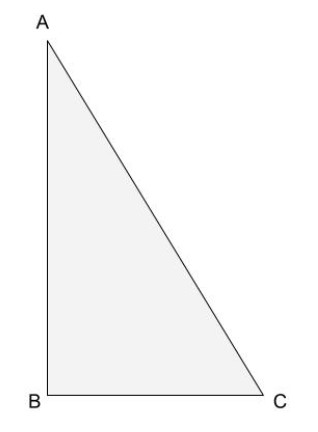
Is it true that Pythagorean triple can never be made up of all odd numbers?
A: Real
B: Negative
C: No
D: Yes
Answer
587.1k+ views
Hint:We know that $a,b,c$ would be triple if and only if its follow ${{\text{a}}^{\text{2}}}{\text{ + }}{{\text{b}}^{\text{2}}}{\text{ = }}{{\text{c}}^{\text{2}}}$ and now we know that square of odd numbers is always an odd number and the square of any even number is an even number.
Complete step-by-step answer:
Pythagoras theorem states that “In a right-angled triangle, the square of the hypotenuse side is equal to the sum of squares of the other two sides“.Here, the hypotenuse is the longest side, as it is opposite to the angle $90^\circ$.

From Pythagoras theorem we can write $(AC)^2= (AB)^2+(BC)^2$
Let AB=a, BC = b and AC =c then we get
${{\text{a}}^{\text{2}}}{\text{ + }}{{\text{b}}^{\text{2}}}{\text{ = }}{{\text{c}}^{\text{2}}}$
Let a be odd, b be odd and c be odd number as we know square of odd number is always odd for e.g. $3$ is an odd number then ${3^2} = 9$ is also odd, $5$ is the odd number then ${5^2} = 25$ is also odd. Therefore square of odd numbers are always odd and we also know that the sum of odd numbers is always equal to even numbers. For e.g. $3 + 5$ gives $8$ here are \[3\,\&\,5\] are odds but $8$ is even.
So by Pythagoras theorem we know
${{\text{a}}^{\text{2}}}{\text{ + }}{{\text{b}}^{\text{2}}}{\text{ = }}{{\text{c}}^{\text{2}}}$
Now L.H.S. is and we know ${\text{a & b}}$ are odd therefore ${{\text{a}}^{\text{2}}}{\text{ & }}{{\text{b}}^{\text{2}}}$ are also odd then sum of ${{\text{a}}^{\text{2}}}{\text{ & }}{{\text{b}}^{\text{2}}}$ must be even but we assumed that ${\text{c}}$ is odd i.e. ${c^2}$ is also odd.
So this case does not follow Pythagoras triplet. If all the numbers are odd then Pythagoras triplet can never be formed. So it is true that Pythagoras triplet never made up all odd numbers.
So, the correct answer is “Option D”.
Note:We know the sum of two even numbers are always even and the sum of one even and one odd is always odd. An odd number is given by $2n + 1$ where $n$ belongs to whole numbers & even numbers are given by $2n$ where $n$ is natural number. So the sum of two even numbers that is $2n + 2n = 4n$ is always even & even+odd i.e. $2n + 2n + 1 = 4n + 1$ which is always odd.
Complete step-by-step answer:
Pythagoras theorem states that “In a right-angled triangle, the square of the hypotenuse side is equal to the sum of squares of the other two sides“.Here, the hypotenuse is the longest side, as it is opposite to the angle $90^\circ$.

From Pythagoras theorem we can write $(AC)^2= (AB)^2+(BC)^2$
Let AB=a, BC = b and AC =c then we get
${{\text{a}}^{\text{2}}}{\text{ + }}{{\text{b}}^{\text{2}}}{\text{ = }}{{\text{c}}^{\text{2}}}$
Let a be odd, b be odd and c be odd number as we know square of odd number is always odd for e.g. $3$ is an odd number then ${3^2} = 9$ is also odd, $5$ is the odd number then ${5^2} = 25$ is also odd. Therefore square of odd numbers are always odd and we also know that the sum of odd numbers is always equal to even numbers. For e.g. $3 + 5$ gives $8$ here are \[3\,\&\,5\] are odds but $8$ is even.
So by Pythagoras theorem we know
${{\text{a}}^{\text{2}}}{\text{ + }}{{\text{b}}^{\text{2}}}{\text{ = }}{{\text{c}}^{\text{2}}}$
Now L.H.S. is and we know ${\text{a & b}}$ are odd therefore ${{\text{a}}^{\text{2}}}{\text{ & }}{{\text{b}}^{\text{2}}}$ are also odd then sum of ${{\text{a}}^{\text{2}}}{\text{ & }}{{\text{b}}^{\text{2}}}$ must be even but we assumed that ${\text{c}}$ is odd i.e. ${c^2}$ is also odd.
So this case does not follow Pythagoras triplet. If all the numbers are odd then Pythagoras triplet can never be formed. So it is true that Pythagoras triplet never made up all odd numbers.
So, the correct answer is “Option D”.
Note:We know the sum of two even numbers are always even and the sum of one even and one odd is always odd. An odd number is given by $2n + 1$ where $n$ belongs to whole numbers & even numbers are given by $2n$ where $n$ is natural number. So the sum of two even numbers that is $2n + 2n = 4n$ is always even & even+odd i.e. $2n + 2n + 1 = 4n + 1$ which is always odd.
Recently Updated Pages
Master Class 10 Computer Science: Engaging Questions & Answers for Success

Master Class 10 General Knowledge: Engaging Questions & Answers for Success

Master Class 10 English: Engaging Questions & Answers for Success

Master Class 10 Social Science: Engaging Questions & Answers for Success

Master Class 10 Maths: Engaging Questions & Answers for Success

Master Class 10 Science: Engaging Questions & Answers for Success

Trending doubts
What is the median of the first 10 natural numbers class 10 maths CBSE

Which women's tennis player has 24 Grand Slam singles titles?

Who is the Brand Ambassador of Incredible India?

Why is there a time difference of about 5 hours between class 10 social science CBSE

Write a letter to the principal requesting him to grant class 10 english CBSE

State and prove converse of BPT Basic Proportionality class 10 maths CBSE




